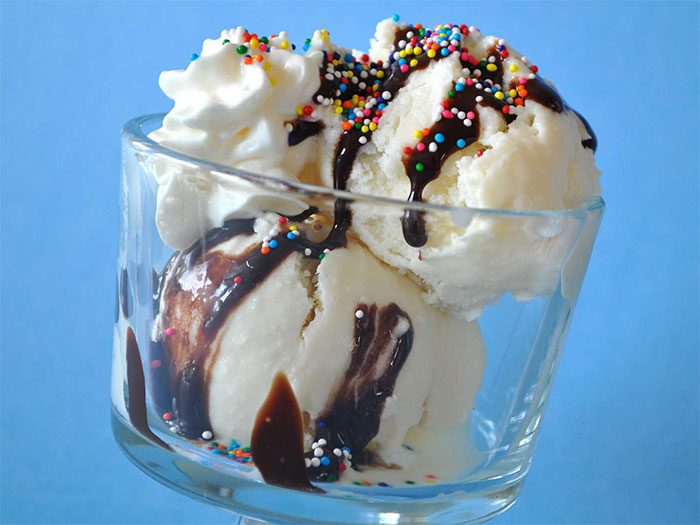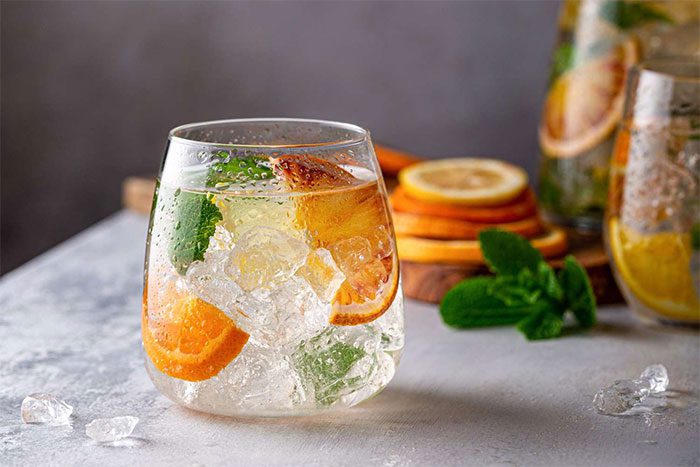In the scorching summer heat, drinking a cold beverage or enjoying an ice cream can be a delightful way to cool off for many. However, consuming these cold items incorrectly can sometimes have adverse effects on your health.
Some people enjoy the refreshing sensation that cold foods and drinks provide, while others believe that consuming them can stimulate digestion. If you want to indulge in cold treats this summer, how can you cool down without harming your body?
Consuming Cold Foods in Summer Depends on Your Physical Condition
According to Life Times, the reason eating cold foods makes people feel cooler is that it stimulates the cold receptors in the oral mucosa and tongue, sending a pleasurable sensation to the brain. Additionally, in response to the temperature change, the brain adjusts the thirst center, allowing cold water to quench thirst better than water at room temperature.

Consuming excessive cold foods in a short period can cause digestive spasms.
What “cooling” foods are harmful to the body in summer? According to traditional Eastern medicine, the impact of cold foods on the body varies based on individual constitution. For those with a hot constitution, moderate consumption of cold foods can help control body heat and achieve a balance of yin and yang; for individuals with excess yin or yang, moderate consumption of cold foods may not be a significant issue.
However, for most people, especially those with yang deficiency and a phlegm-damp constitution, consuming too many cold and cooling foods can deplete or inhibit yang energy in the body, exacerbate cold and damp pathogens, and harm the functions of the spleen and stomach.
From a modern medical perspective, the body has a stable and precise thermoregulation mechanism, maintaining body temperature between 36°C to 37°C under normal conditions. Drinking a moderate amount of cold beverages will not significantly affect body temperature. However, cold items like ice cream, which are high in sugar, can lead to excessive calorie intake. Eating too many cold foods in a short time can also cause digestive spasms, leading to abdominal pain, diarrhea, and other symptoms.
Guidelines for Enjoying Cold Foods and Beverages Safely
The hot summer weather makes it hard to resist cold foods and drinks for relief. To enjoy them safely, keep the following guidelines in mind.
1. Consume Cold Foods and Beverages Slowly
When enjoying cold items, avoid consuming large amounts at once; eat slowly to help reduce digestive stimulation. Do not eat more than two ice creams at a time and limit yourself to half a bottle of cold beverage per sitting.
It’s best to sip cold liquids slowly and gradually. When consuming iced foods, allow them to warm in your mouth before swallowing, so they reach body temperature to minimize irritation to the brain, throat, and respiratory tract.
2. Pair with Warming Foods
After consuming cold foods, consider incorporating some warming foods into your diet. For example, when cooking, using a bit of ginger, cardamom, or orange peel can help strengthen the spleen, dispel dampness, regulate the stomach, and eliminate pathogens.

Avoid drinking cold beverages before or right after meals.
3. Choose the Right Timing
Regardless of whether it’s icy food or cold beverages, do not consume them while exercising vigorously or within an hour after exercise.
At this time, blood vessels in the body rapidly dilate; if a large amount of cold food is consumed, the blood vessels will quickly constrict, leading to symptoms such as sore throat, severe headaches, and abdominal pain. In severe cases, this can result in cardiovascular and cerebrovascular accidents.
Additionally, avoid drinking cold beverages immediately before or after meals; it is generally advisable to wait 30 minutes after meals or after a nap.
4. Avoid Alternating Hot and Cold
In summer, do not alternate between hot and cold drinks; consuming them consecutively can be very stimulating to the mouth and digestive system. There should be at least a 30-minute gap between drinking cold and hot beverages.
5. Avoid Unsanitary Cold Foods and Beverages
Do not consume frozen foods that have been stored for too long, soft drinks, or ice cream without brand logos.
Many types of bacteria can survive for extended periods at low temperatures; once food or drinks have been stored in the refrigerator for too long, bacteria can proliferate, and in severe cases, this can lead to liver poisoning after consumption.



















































